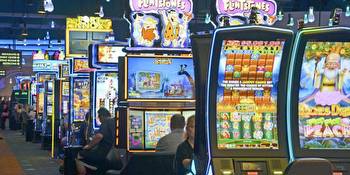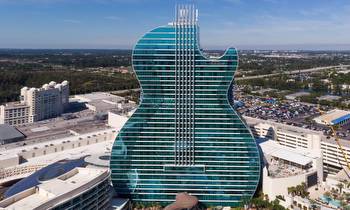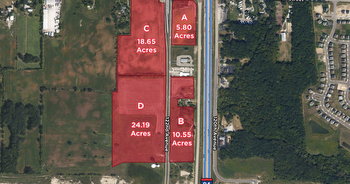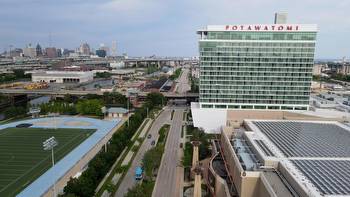Potawatomi casino's gambling wins return to near pre-pandemic levels

The Potawatomi tribe's Milwaukee casino is recovering from the COVID-19 pandemic.
The casino at 1721 W. Canal St. won at least $388 million — and likely more than $400 million — from gamblers during the 12-month period that ended June 30. That figure is nearly $100 million more than it raked in during the prior 12-month period.
Gene Johnson, a gaming consultant at a national company, Victor-Strategies, said it is not surprising that people returned to the blackjack tables and slot machines as soon as they were able to do so.
"Gaming is very human behavior," Johnson said. "Risk-taking behavior is part of the human constitution."
Thanks to people willing to take that risk, Potawatomi casino won about 33% more during the 12 months that ended June 30 compared to the amount won during each of two prior years when the casino imposed restrictions on its operations because of the pandemic.
The tribe posted a net win of $291 million during the 12-month period that ended June 30, 2021.
The net win is the amount of money that gamblers lose at slot machines and table games and doesn't reflect revenue from restaurants, concerts and the hotel.
Indian casino revenue is confidential. However, Potawatomi gaming revenue can be estimated because the tribe pays the city and county of Milwaukee 1.5% of its net win. The payment was $5.8 million to each government for the year that ended June 30. The tribe paid the city and county $4.4 million in 2021.
The Journal Sentinel estimate of the tribe's revenue is conservative because it is calculated after the tribes pay a multi-million dollar fee to the state. The fee can be as high as about $25 million annually.
The amount of the state payment is confidential.
The tribe's net win was just 4% below the amount it collected in 2019 — the last full year before the pandemic struck. Gamblers lost at least $406 million to Potawatomi slot machines and table games that year.
"We are coming back from COVID but we are not at the pre-COVID levels," said Jeff Crawford, the tribe's attorney general.
 Drone view of Potawatomi Casino in Milwaukee
Drone view of Potawatomi Casino in MilwaukeeThe casino houses about 2,500 slot machines or roughly the same number it had prior to the pandemic, according to a casino spokesman. It currently employs about 1,805 down from the approximately 2,700 that worked there prior to the pandemic.
The casino has 40 tables open for games such as blackjack and craps, down from 80 prior to the pandemic.
The tribe's off-track betting, poker room and four of its seven restaurants remain closed, the spokesman said. The casino plans to offer a sports book operation to take bets on sporting events later this year.
The Milwaukee casino's financial rebound from COVID, while significant, lagged behind that of other tribal casinos across the nation.
Nationwide, tribes tribal casinos won $39 billion — an increase of 40%, according to the National Indian Gaming Commission.
"This is Indian gaming's largest increase, following its greatest decrease brought on by a record level of pandemic related closures," the commission said in a statement.
There are 510 Indian gaming operations owned by 243 tribes in 29 states.
While the Potawatomi is enjoying the current rebound in business, its leaders are nervously watching the expected boom in casinos near the Wisconsin-Illinois border.
The Ho-Chunk Nation has received state and federal approval to build a casino complex in Beloit that it hopes to open within the next two to three years and the Menominee tribe is again working with Hard Rock International in the hopes of opening a casino in Kenosha County.
On the Illinois side of the border, casinos have opened or are being proposed in Chicago, Rockford and Waukegan.
"The Illinois expansion is unprecedented at least in the Midwest," said Crawford, of the Potawatomi tribe. "It will probably start saturating the market at some point."
The Potawatomi tribe played a key role in killing a Kenosha casino that the Menominee tribe sought to open in Kenosha several years ago. That casino complex was to be financed and managed by Florida-based Hard Rock but the proposal died in 2015 when Gov. Scott Walker said he would not approve it.
The governor has unilateral authority to veto any off-reservation casino in his or her state.
A company linked to Hard Rock recently bought an option to purchase 60 acres of land near the Village of Bristol in Kenosha County.
If the Menominee and Hard Rock launch a new bid for a Kenosha casino the Potawatomi will again launch a political fight to block it, Crawford said.
"We most definitely do not support a Kenosha casino," Crawford said. "The Potawatomi will aggressively resist the Florida interests that will try to get a casino."
While it is unknown which casino proposal will succeed and which will fail, it is a good bet that there will be more attempts to grow the gambling industry in Wisconsin.
Said Johnson, the gaming consultant: "There will always be new casinos. Gaming is a pleasure for many humans and a sickness for others and its not going to change."



























